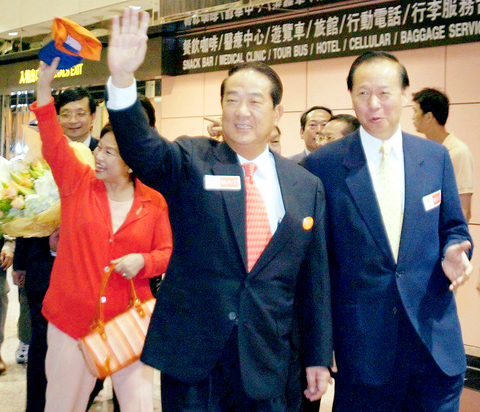People First Party (PFP) Chairman James Soong (宋楚瑜) said yesterday that he is willing to meet with President Chen Shui-bian (陳水扁) regarding the six-point communique he drew up with Chinese President Hu Jintao (胡錦濤) on Thursday, and said the communique was a breakthrough. China had committed on paper their acknowledgement of the so-called "1992 consensus" and promised not to take military action should Taiwan abstain from making any moves toward independence, he said.
"If President Chen sees the text and publicized results of our [Hu and Soong] meeting and if he feels he needs to better understand it, I am willing to meet with him. If he wishes to meet, and he sees clearly [the situation] and is willing to push through [the meaning of the communique], then I am very willing to see him," said Soong yesterday.
Soong yesterday returned from a nine-day tour of China, during which he visited four Chinese cities and met with Hu in his capacity as Chinese Communist Party (CCP) chairman. During the meeting, the second between a Taiwanese opposition leader and Hu this month, Soong and Hu drew up a six-point communique which reiterated their parties' united stance on their opposition to Taiwanese independence, support for the so-called "1992 consensus," and China's willingness to push through various economic proposals, including a cross-strait free trade agreement.

PHOTO: YAO CHIEH-HUI, TAIPEI TIMES
Speaking to the media at the airport upon his return to the nation at 3:30pm and at press conference later yesterday, Soong gave a further explanation of his six-point agreement with Hu and welcomed the news yesterday from China's Taiwan Affairs Office (TAO) that China had decided to offer various policy "gifts" to Taiwan.
At the PFP press conference yesterday, Soong clarified that the new term, "two sides of the Strait, one China," was a new way of considering the "1992 consensus," and was not meant to take the place of the often-referred to concept behind the consensus: the "one China principle, with different interpretations."
The new phrase, "two sides of the Strait, one China" recognizes the reality of the cross-strait situation, given the historical conflict between the governments of China and the Republic of China, Soong said.
"It is important to restore the historical truth of the cross-strait situation. As a result, the phrase `two sides of the Strait, one China,' acknowledges the equal relationship between [China and Taiwan]," Soong said.
A further breakthrough, according to Soong, is having China commit to paper the specific origins of the "1992 consensus."
The so-called "1992 consensus" refers to an so-called agreement between Taiwanese and Chinese negotiators during a 1992 meeting in Hong Kong to base any future negotiations on the "one China" principle, but what is meant by "one China" can be interpreted differently.
While the pan-blue camp said the consensus should serve as the basis of a new round of talks between Taiwan and China, the current administration has stated on many occasions that it does not acknowledge the consensus and that it does not exist.
Because Soong-Hu the communique characterizes the current cross-strait situation as "two sides of the strait, one China," Soong suggested the Chen administration choose to accept the terminology and interpret the "1992 consensus" in this way.

‘DENIAL DEFENSE’: The US would increase its military presence with uncrewed ships, and submarines, while boosting defense in the Indo-Pacific, a Pete Hegseth memo said The US is reorienting its military strategy to focus primarily on deterring a potential Chinese invasion of Taiwan, a memo signed by US Secretary of Defense Pete Hegseth showed. The memo also called on Taiwan to increase its defense spending. The document, known as the “Interim National Defense Strategic Guidance,” was distributed this month and detailed the national defense plans of US President Donald Trump’s administration, an article in the Washington Post said on Saturday. It outlines how the US can prepare for a potential war with China and defend itself from threats in the “near abroad,” including Greenland and the Panama

A magnitude 4.9 earthquake struck off Tainan at 11:47am today, the Central Weather Administration (CWA) said. The hypocenter was 32.3km northeast of Tainan City Hall at a depth of 7.3km, CWA data showed. The intensity of the quake, which gauges the actual effect of a seismic event, measured 4 in Tainan and Chiayi County on Taiwan's seven-tier intensity scale, the data showed. The quake had an intensity of 3 in Chiayi City and County, and Yunlin County, while it was measured as 2 in Kaohsiung, Nantou County, Changhua County, Taitung County and offshore Penghu County, the data showed. There were no immediate reports of

The Chinese Nationalist Party (KMT) is maintaining close ties with Beijing, the Democratic Progressive Party (DPP) said yesterday, hours after a new round of Chinese military drills in the Taiwan Strait began. Political parties in a democracy have a responsibility to be loyal to the nation and defend its sovereignty, DPP spokesman Justin Wu (吳崢) told a news conference in Taipei. His comments came hours after Beijing announced via Chinese state media that the Chinese People’s Liberation Army’s Eastern Theater Command was holding large-scale drills simulating a multi-pronged attack on Taiwan. Contrary to the KMT’s claims that it is staunchly anti-communist, KMT Deputy

RESPONSE: The government would investigate incidents of Taiwanese entertainers in China promoting CCP propaganda online in contravention of the law, the source said Taiwanese entertainers living in China who are found to have contravened cross-strait regulations or collaborated with the Chinese Communist Party (CCP) could be subject to fines, a source said on Sunday. Several Taiwanese entertainers have posted on the social media platform Sina Weibo saying that Taiwan “must be returned” to China, and sharing news articles from Chinese state media. In response, the Mainland Affairs Council (MAC) has asked the Ministry of Culture to investigate whether the entertainers had contravened any laws, and asked for them to be questioned upon their return to Taiwan, an official familiar with the matter said. To curb repeated